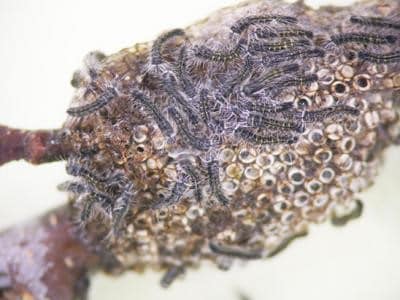Eastern Tent Caterpillar Eggs Hatching in Central Kentucky

Potter said that, after spending about nine months in eggs masses on twigs of wild cherry and related trees, the first tiny caterpillars of the season are now leaving their eggs. The larvae are among the first insects to become active in the spring and are well-equipped to cope with Kentucky’s erratic temperature swings.
Entomology researchers at UK entomology researchers said the egg hatch occurs over several weeks in early spring, which increases the chance for survival in case of late freezes. The caterpillars grow and develop when the temperature is above 37 degrees F. Their preferred food plants are wild cherry, apple, and crabapple, but they can be found on hawthorn, maple, cherry, peach, pear, and plum trees, as well.
When mature, the 2- to 2.5-inch long hairy caterpillars wander from their host trees to seek protected areas to spin their cocoons or seek additional food if their natal tree becomes defoliated. At such times, they can crawl along fence lines and into pastures
Create a free account with TheHorse.com to view this content.
TheHorse.com is home to thousands of free articles about horse health care. In order to access some of our exclusive free content, you must be signed into TheHorse.com.
Start your free account today!
Already have an account?
and continue reading.
Written by:
University of Kentucky College of Agriculture, Food and Environment
Related Articles
Stay on top of the most recent Horse Health news with












